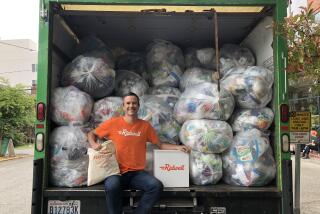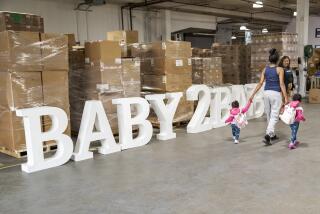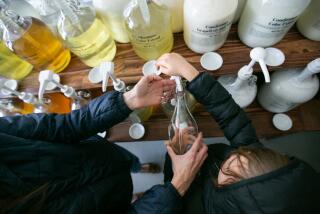Cleaning Up at Dirty Work : Companies Merge to Offer Recyclable Disposable Diaper Service
- Share via
SANTA ANA — Babyland Diaper Service is betting its bottom dollar that people who now buy disposable diapers would switch to home delivery if they knew that the service bringing the clean diapers would haul off the soiled ones for recycling.
To that end, Babyland Diaper Service in Santa Ana, which has kept Orange and San Diego County infants in cloth diapers for nearly half a century, said this week that it has bought Dydee Diaper Service in Brea as part of its plan to introduce recyclable disposable diaper service across Orange County.
The company, which did not disclose terms of the acquisition, will now employ about 130 people in Orange, Riverside and San Diego counties. The two companies together provide pickup and delivery of cotton diapers to about 18,000 families a year. (The merger does not affect Dydee Diaper Service in Los Angeles, which has a different owner.)
Dydee, which has been in Orange County for 54 years, will keep its name, and no changes in operations are planned, said James Houlihan, who is general manager of the combined company. “In fact, within a three-year period, we expect to double our employees,” he said.
The two companies have always been “friendly competitors,” Houlihan said. Dydee was not on the market but took Babyland up on its offer to buy.
Babyland has recently developed a recyclable disposable diaper that it plans to offer to Orange County residents through both diaper services within a month. About 1,000 families already use the service, which was test-marketed in San Diego, Houlihan said. The company expects as many as 10,000 families to change to recyclable disposables within three years.
The service works just like regular cloth-diaper delivery, Houlihan said. “You just take them off the baby and put them in the hamper. We do the rest.’
The rest involves separating the diaper. The plastic is extruded and recycled at a plant in Ontario. The paper pulp is also shipped off for recycling. And the absorbent material in the middle is “neutralized,” then disposed of as liquid waste.
Disposable diapers, which have grown into a $3.5-billion-a-year business, have been a messy problem for environmentalists since they became widely popular in the 1970s.
According to the National Assn. of Diaper Services in Philadelphia, about 18 billion disposable diapers are buried in landfills every year. Figuring that each diaper weighs about eight ounces, the trade group says, that’s more than 12,300 tons of waste a day.
Disposables are still by far the largest segment of the diaper market, Houlihan said. In cities where diaper service is not available, about 85% of diapers that get changed are then thrown away. Where diaper services offer an alternative, disposables account for 75% to 80% of the changes.
Although cloth customers will remain Babyland’s primary market, the recycling program is a way for the diaper service to respond to both the demand for disposable products and the need for an environmental solution to getting rid of them.
Growth in the use of cloth-diaper services peaked about three years ago along with heightened public awareness of the problem of dumping disposables, Houlihan said. Since then, use of cloth diapers has increased more slowly. Market research indicates that consumers would be willing to pay $2 to $3 a week more to have both the convenience of disposables and the environmental soundness of a recyclable product.
More to Read
Inside the business of entertainment
The Wide Shot brings you news, analysis and insights on everything from streaming wars to production — and what it all means for the future.
You may occasionally receive promotional content from the Los Angeles Times.










